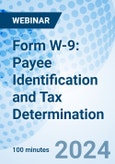Prevent costly penalties and learn how to safely manage requirements and procedures surrounding Form W-9.
In recent years, the IRS has stepped up its compliance efforts in the area of information reporting and withholding, including Forms 1099 and backup withholding. The Service has greatly enhanced its technological capabilities and more companies are now receiving automated notices and penalties for noncompliance. This topic will help U.S. withholding agents better understand the requirements for collecting and validating Forms W-9 and correctly reporting the information on Form 1099. It will also address common mistakes and best practices to enhance operational efficiency and avoid penalties. In situations where the IRS has already issued a penalty notice, the material will also discuss the strategies and procedures for drafting a response.
Learning Objectives
- You will be able to define who is considered an exempt recipient for Form 1099 reporting.
- You will be able to describe the different types of Form 1099 reporting.
- You will be able to discuss the benefits of using the IRS’s TIN matching program.
- You will be able to explain the penalties that may be assessed if Form 1099 reporting is not performed correctly.
Agenda
Due Diligence
- Documenting U.S. Persons
- Form W-9 Validation and Common Mistakes
Reporting
- Determining Who to Report
- Deadlines and Extensions
Backup Withholding
- B Notices
- TIN Matching
Penalties
- Penalty Notices
- Penalty Abatement
Speakers

Andrew McQuilkin,
KPMG LLP- Senior manager at KPMG Boston
- Practice emphasizes all aspects of information reporting and withholding
- Conducts regular seminars and workshops on numerous issues related to domestic and international information reporting and technology solutions for compliance
- Member, Massachusetts Bar. Patent Attorney, U.S. Patent and Trademark Office
- J.D. degree, Suffolk University School of Law; B.S. degree, University of Massachusetts Amherst
Who Should Attend
This live webinar is designed for accountants, CFOs, controllers, accounts payable professionals, tax managers, tax preparers, presidents, vice presidents, bookkeepers, and enrolled agents.









